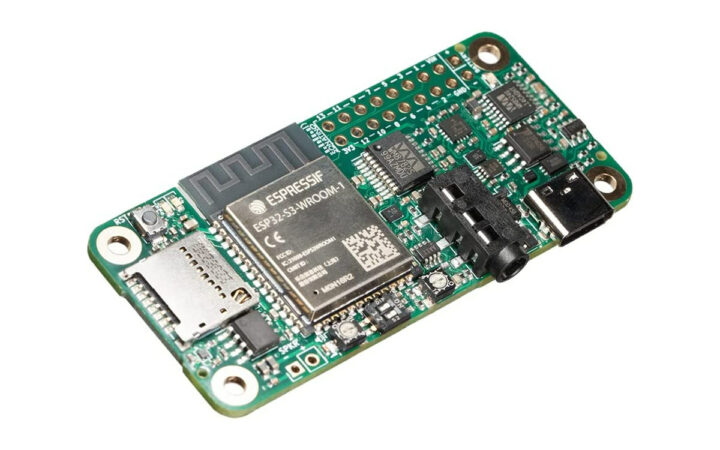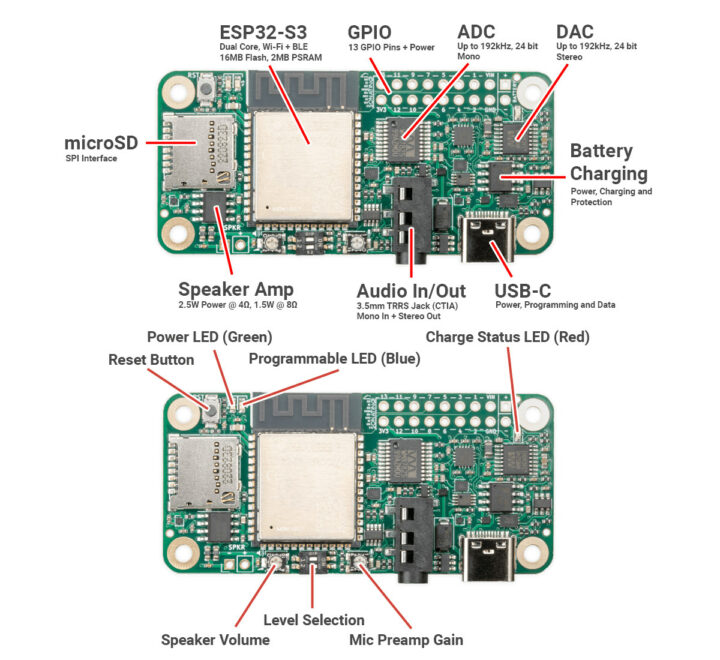Lumination Labs’ Sonatino is an ESP32-S3 board designed for audio applications that follows the Raspberry Pi Zero dimensions so that it can be used with some of the cases designed for the Raspberry Pi Zero.
The wireless audio board features Cirrus Logic WM8524 audio DAC and WM8782 audio DAC capable of 24-bit 192kHz stereo output and mono input respectively, a speaker amplifier and two pins for speaker connection, a 3.5mm audio jack, as well as a microSD card slot for the storage of audio or other data.
Sonatino specifications:
- Wireless Module – ESP32-S3-WROOM-1 with
- SoC – ESP32-S3 dual-core LX7 microprocessor @ up to 240 MHz with Vector extension for machine learning
- Memory – 2MB PSRAM
- Storage – 16MB flash
- Connectivity – WiFi 4 and Bluetooth 5 LE/Mesh
- Storage – MicroSD card slot (SPI)
- Audio
- 3.5mm audio jack supporting input and output (TRRS, CTIA standard)
- Speaker connection: onboard pins, optional screw terminal
- DAC: Cirrus Logic WM8524 up to 24-bit 192kHz output (stereo)
- ADC: Cirrus Logic WM8782 up to 24-bit 192kHz input (mono)
- Audio format: I2S
- Speaker Amp – PAM8302 2.5W @ 4 (mono) with adjustable volume
- Stereo Headphone Amp: TPA6132A2
- Microphone Preamp: MAX4467
- Input Level: Mic or line level
- Output Level: Line or headphone level
- USB – 1x USB Type-C for power, programming, and data
- Expansion – 2x 8-pin headers with 13 GPIOs, Vin, +3.3V, GND
- Misc
- Trim pots for adjusting speaker volume and mic gain
- Dip switches for selecting mic/line level and line/headphone level
- Power, charging, and user LEDs
- Power Supply
- 5V via USB-C port
- 3.7V LiPo/Li-Ion battery via onboard pins or optional JST PH 2 battery connector
- Charging circuit including overcharge and over-discharge protection
- Low-Power Mode – ESP32-S3 supports deep sleep, and audio components can be put into low-power mode to extend battery life
- Dimensions – 65 x 30 x 7mm (Same size as Raspberry Pi Zero)
- Weight – 11 grams
You’ll find two Arduino code samples on GitHub: one playing an MP3 file from the flash or microSD card, and the other performing real-time audio processing with a basic reverb effect. The latter uses Verlib which runs on the CPU and does not involve the vector extension for processing.
The developer is selling the Sonatino board on Amazon for $49.99 but it’s currently out of stock. More boards are coming in the next few weeks. Note it’s basically a personal project, which explains the relatively high price and limited availability as explained on Reddit. We’ve written about several ESP32 audio boards in the past including the official ESP32-LyraTD-MSC from Espressif, ESP32-A1S audio development kit, the PICO DSP board, and others, but I think the Sonatino is the first ESP32-S3 board I’ve seen.
Via Hackster.io

Jean-Luc started CNX Software in 2010 as a part-time endeavor, before quitting his job as a software engineering manager, and starting to write daily news, and reviews full time later in 2011.
Support CNX Software! Donate via cryptocurrencies, become a Patron on Patreon, or purchase goods on Amazon or Aliexpress






